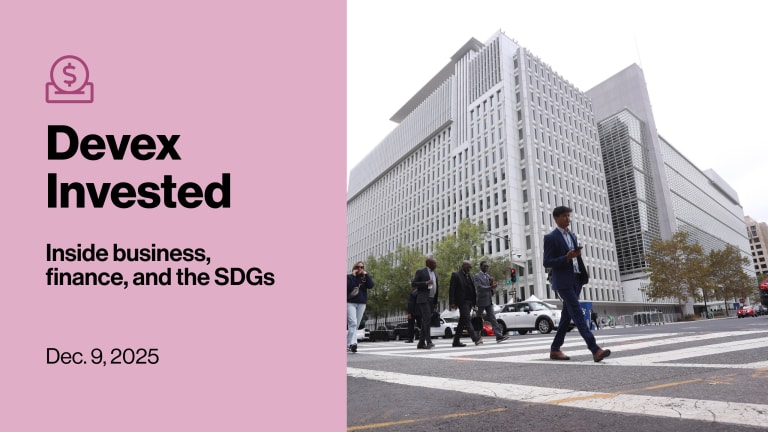
China has become a key source of finance for low- and lower-middle-income countries, far outpacing its global rivals. Much of that lending has been opaque.
But a new report — “Banking on the Belt and Road,” which is backed by the release of a new dataset unpacking Chinese finance — shows that many nations may have greater debt burdens than previously understood. The report caught my attention last week because it highlights some facts and trends that, until now, have been more speculative.
This is a preview of Devex Invested
Sign up to this weekly newsletter inside business, finance, and the SDGs, in your inbox every Tuesday.
• China has gone from primarily lending to central government institutions to doing nearly 70% of its overseas lending to state-owned companies, state-owned banks, special purpose vehicles, and other entities since launching the Belt and Road Initiative in 2013, according to the report from AidData.
• This creates a “hidden debt problem” that is getting worse over time, according to Brad Parks, AidData’s executive director. Those unreported debts are worth about $385 billion, and the average annual underreporting of repayment liabilities to China went from $13 billion before BRI launched to $40 billion afterward. That means the average country is underreporting actual and potential repayment obligations by about 5.8% of its gross domestic product.
• What else did we learn? China is outspending the U.S. and other “major powers” by more than 2 to 1. China also leans on collateral to mitigate risk, with 40 of the 50 largest loans from its state-owned creditors being collateralized. China also typically has higher interest rates and shorter repayment periods for its lending, compared with countries such as Germany, France, or Japan.
Also of note: Another new report looks at China’s green bonds market. The country was the second-largest issuer of labeled green bonds globally in 2020. Of the $44 billion worth of green bonds issued in 2020, only about $23.8 billion was aligned with both Chinese and Climate Bonds Initiative definitions of “green.”
ICYMI: How does China lend? Insight from a study of 100 loans
Out of business?
The World Bank has scrapped its flagship annual Doing Business report, following an investigation that revealed multiple efforts to influence the rankings and manipulate outcomes in favor of countries such as China and Saudi Arabia — to the detriment of other nations that slid down the list.
My colleague Shabtai Gold has a deep dive into the seemingly perennial controversy around the long-running report and what might be next. Some say that reforms to its process — which promoted an approach susceptible to manipulation and indifferent to local needs, according to critics — are long overdue.
“It’s an inherently problematic setup. … Folks game the system to try to move up the ladder,” according to Chris Humphrey, a senior research associate at the Overseas Development Institute. He went so far as to borrow a phrase from the TV show “The Wire”: “It’s juking the stats,” he tells Shabtai.
Devex Pro: After World Bank scandal, what's the future of Doing Business?
+ A Devex Pro subscription offers deeper analysis of the development sector, exclusive access to digital events, and the opportunity to engage directly with our newsroom. Get access to these perks by signing up to our 15-day free trial.
Climate ratings
Your next job?
Mid-Career Program for Experienced Economists
International Monetary Fund
United States
Moody’s, the credit ratings company, has joined the Taskforce on Nature-related Financial Disclosures — a global initiative housed at the Green Finance Institute and supported by United Nations agencies — and will help develop a framework on nature-related risks and a set of reporting guidelines.
“Currently, financial institutions and companies do not have complete information to help them understand how nature-related risks impact long- and short-term financial performance,” Moody’s said in a press release. “The TNFD will assist financial institutions and companies with incorporating nature-related risks and opportunities into their strategic planning, risk management and asset allocation decisions.”
Tune in
My boss, Raj Kumar, will be speaking with Luis Alberto Moreno, who served for 15 years as president at the Inter-American Development Bank before stepping down last year, about shaping post-pandemic growth in Latin America. Join us for today’s conversation at 12 p.m. ET (6 p.m. CET).
Investments of interest
• Development Partners International, a private equity firm, announced a final close at $900 million for a fund aligned with achieving the Sustainable Development Goals. The African Development Partners III Fund is “one of the largest funds dedicated to investing global capital in Africa.” It will focus on established and growing companies benefiting from Africa’s expanding middle class and increased digital transformation, according to DPI.
• The Global Innovation Lab for Climate Finance launched six financial instruments aiming to mobilize $380 million for sustainable energy access, food systems, and urban infrastructure. The instruments will expand the pipeline of sustainable infrastructure projects in West Africa, provide guarantees for the biogas industry in Brazil, and support agriculture-related small and medium-sized enterprises.









